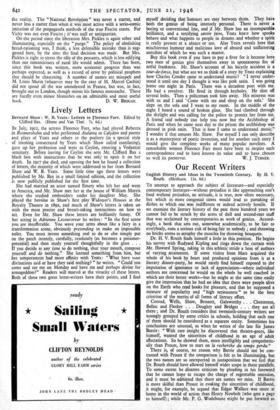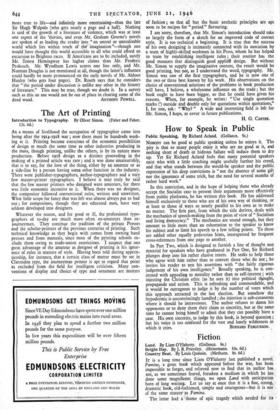Our Recent Writers
English History and Ideas in the Twentieth Century. By H. V. Routh. (Methuen. Ils. 6d.)
To attempt to approach the subject of literature—and especially contemporary literature—without prejudice is like approaching one's food without prejudice, an attitude, it is true, now often necessary, but which in more congenial times would lead to partaking of dishes to which one was indifferent or indeed actively hostile. If we examine the literary history of the past three hundred years we cannot fail to be struck by the acres of dull and second-rate stuff that was acclaimed by contemporaries as work of genius. Accord- ingly, a book that sets out, somewhat academically, to be fair to everybody, runs a serious risk of being fair to nobody • and throwing no bricks seems to atrophy the muscles for throwing bouquets.
Dr. H. V. Routh finds himself a little in this position. He begins his survey with Rudyard Kipling and rings down the, curtain with Mr. Howard Spring, taking in this athletic stride a host of authors of varying attainment. If some visitor from Mars acquired the whole of his book by heart and produced opinions from it at a literary dinner-party, he would rarely find himself exposed to the imputation of ignorance or lack of appreciation—where individual authors are concerned he would on the whole be well coached in which are their better works—but he might at the same time easily give the impression that he had no idea that there were people alive on the Earth who read books for pleasure, and that he supposed a mixture of popularity and "high seriousness " to be the best criterion of the merits of all forms of literary effort. Conrad, Wells, Shaw, Bennett, Galsworthy . . Chesterton, Belloc and Flecker . . . Doughty and Bridges . . . they are all there ; and Dr. Routh considers that twentieth-century writers are wrongly grouped by some critics in schools, holding that each one of them should be considered as a separate entity. Sometimes his conclusions are unusual, as when he writes of the late Sir James Barrie: " With rare insight he discovered that theatre-goers, like himself, wanted the sincerities of childhood in an age of adult affectations. So he showed them, more intelligibly and sympathetic- ally than Proust, how to start on la recherche du temps perdu."
There is, of course, no reason why Barrie should not be con- trasted with Proust if the comparison is felt to be illuminating, but the two names are so unexpected in juxtaposition that we feel that Dr. Routh should have allowed himself wider scope in these parallels. To some extent he disarms criticism by pleading in his foreword that he cannot hope to escape the charge of regrettable omission, and it must be admitted that there are names we miss. If Barrie is more skilful than Proust in evoking the sincerities of childhood, it might, for example, be argued that Edgar Wallace was more at home in the world of action than Henry Newbolt (who gets a page to himself); while Mr. P. G. Wodehouse might be put forward as more true to life—and infinitely more entertaining—than the late Sir Hugh Walpole (who gets nearly a page and a half). Nothing is said of the growth of a literature of violence, which was at least one aspect of the 'thirties, and even Mr. Graham Greene's novels are spoken of as leading the reader into " an unreal or unrealisable world which lies within reach of the imagination "—though one would have thought this world accessible to all who could afford an excursion to Brighton races. If Americans are to be included, surely Mr. Ernest Hemingway has higher claims than Mr. Frederic Prokosch. Mr. Wyndham Lewis scores one line only, and Mr. Norman Douglas is not mentioned at all, though the latter's influence could hardly be more pronounced on the early novels of Mr. Aldous Huxley (who gets four pages). Dr. Routh says that he considers that " the period under discussion is unlike any other in the history of literature." This may be true, though we doubt it. In a survey such as this an axe would not be out of place in clearing some of the



























 Previous page
Previous page